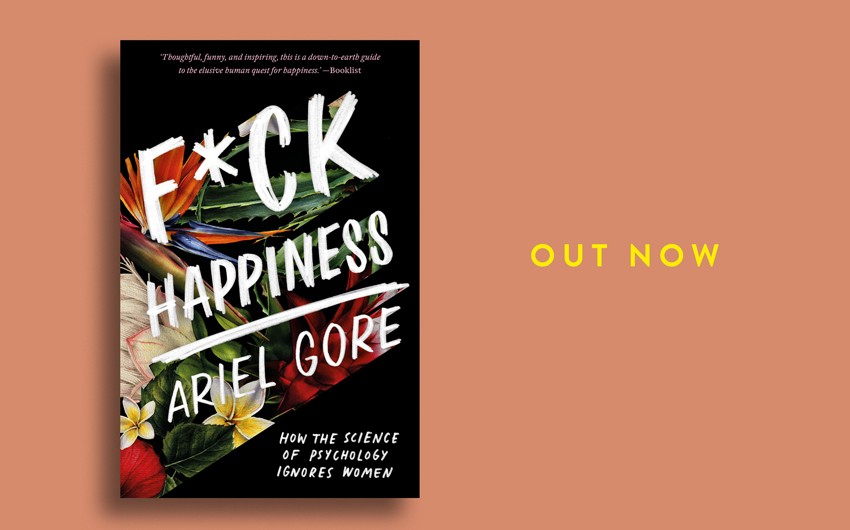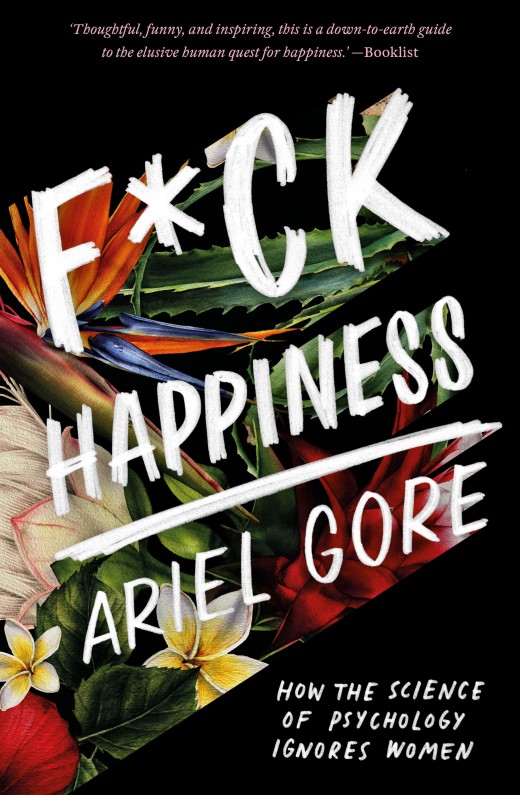News

News >
Read an extract: F*ck Happiness
A lot has happened in the ten years since Ariel Gore wrote the bestselling book now known as F*ck Happiness. In this extract from the updated edition, she reflects on resistance and joy.
Between the original publication of Bluebird and this ten-year anniversary edition we’re calling F*ck Happiness, let’s face it: some pretty ugly shit has gone down.
Misogyny and white supremacy took center stage in the political discourse.
American happiness tanked.
A 2019 Gallup poll showed significant spikes in stress levels, anger, worry, and general negative experiences among people who live in the United States. The U.S. was now on par with Greece, which had led the stress and negativity rankings since the financial crisis there.
Statisticians always caution against confusing correlation with causality, but Gallup researchers certainly correlated the rise in negative experiences with being under fifty, earning a low income, and hating the 45th president.
Why aren’t you smiling, honey?
Because I’m relatively young, completely broke, and I feel like I’m trapped in a car that’s been commandeered by a drunk, racist, transphobic rape-apologist! NBD.
Globally, things weren’t much better. Negative experiences had remained at record levels since 2017, and worry and sadness reached new heights.
But with the rise of overt American fascism, white nationalism throughout the Western world, and a sense of helplessness about it all everywhere, some sweeter movements have taken root, too.
Margaret, another original participant in the femme happiness project that became this book, says, I’m carefully riding it out and look forward to the next blue wave. For me, progress in marriage rights, trans respect, and the exploration of the gender continuum is powerful. That’s all still happening amidst the debacle.
Feminists and anti-racists are interrogating our own internalized misogyny and white supremacy like the world’s on fire – well, because it is – and we’re building new alliances daily.
Trans politics have come into mainstream focus. More and more people understand that gender isn’t a biological imperative but rather a complex set of social constructions that, once understood as constructions, can be deconstructed in service of personal and collective liberation.
At the same time, the question of reparations for slavery, once a fairly radical idea, has started gaining mainstream traction.
Not one to wait around for the government to act on the large scale to make things right, Seattle-based artist Natasha Marin launched a reparations social media group where anyone could chip in. She noted that a lot of folks think of privilege as money, but privilege is intersectional – it may have to do with money, with other resources, with gender, race, ethnicity, sexuality, being cisgender, having a blue passport, or what-have-you. Natasha invited People of Color to ask for what they needed to be happier. She invited people who identified as white to offer services or contributions. In the social media group, requests and offerings are quietly made and supported daily. Most individual exchanges aren’t wildly system-smashing: Maybe a mother will post that her daughter wants to go on a school trip to Washington DC and a person who identifies as white will read that and think, Hey, I remember when my daughter needed money for school trips I used to hit up my grandmother. Here’s a chance to pay that forward.
In 2019, the students at Georgetown voted to create a fund for reparations in acknowledgement of the stolen labor that made that university possible. Mainstream politicians like Kamala Harris and Elizabeth Warren have begun to acknowledge that it’s high time for real conversations about larger-scale reparations.
There’s a lot of talk about forgiveness in positive psychology, and I’m all for forgiveness, but truth and amends – and leveraging privilege toward repairing the consequences of exploitation and abuse – promise even more powerful healing.
Resistance, as Alice Walker has pointed out, is the secret of joy. America’s volatile and ugly political reality has brought forth a new reckoning with the concepts of personal and collective resistance. What could our resistance look like now? Could we recognize and celebrate that resistance might look and feel different for each of us – individual as a fingerprint?
#blackjoy emerged as an expansive movement.
#metoo spoke truth to the pervasiveness of sexual harassment and sexual violence in the workplace and beyond.
#transisbeautiful highlighted life beyond what Time magazine called the ‘transgender tipping point’ of visibility.
A friend facing a major health crisis texted me: I keep coming back to the question, how do I want to live?
We work toward equity and liberation, and we find joy in the midst of the life that is here and now.
Patriarchy promised us lots of shiny things in exchange for pretending to be happy in the face of oppression, but the patriarchy has been exposed as a con artist.
To the peddlers of fake cheer, we say fuck off.
Turns out the patriarchy is worse than a Ponzi or pyramid scheme – it isn’t paying out those promised rewards to anyone. But let’s not dwell in that betrayal. Instead let’s embrace the truth as our liberation.
We can be happy and sad at the same time.
And we still don’t have to smile – unless we feel like it.
The days that keep coming and going – each one is a unique opportunity to be ourselves, to pay into our ‘fuck you funds,’ to cultivate who and what, in the midst of inferno, are not inferno, and give them space, to express our genders and all of our other awkward and beautiful identities in ways uniquely our own – to keep working for equity and liberation and, at the same time, embrace our most excellently radical joy.
This is an edited extract from F*ck Happiness, out now.
Share this post
About the author
Ariel Gore is a feminist, journalist, writer and teacher. The author of several books on parenting, feminism and queer culture, she is also the publisher of Hip Mama, an award-winning magazine covering the culture and politics of motherhood. Her writing has been described as ‘eloquent, sensitive, and revolutionary’ and novelist Marc Acito dubs her ‘an adventurer, the Indiana Jones of literature’.
More about Ariel Gore




